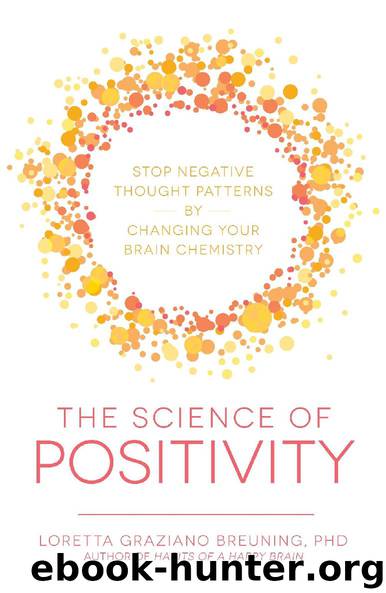The Science of Positivity by Loretta Graziano Breuning

Author:Loretta Graziano Breuning [Breuning, Loretta Graziano]
Language: eng
Format: epub
Published: 2016-12-02T00:00:00+00:00
Science Summary
Oxytocin creates the good feeling of social trust, but an oxytocin droop feels so bad that people strive to stimulate more in sometimes surprising ways.
The mammal brain evolved to seek safety in numbers. Humans like their independence, of course. We hate to be “one of the herd.” But our mammal brain sees isolation as a survival threat. The result is a constant dilemma: a bad feeling when with a herd, and a bad feeling without one.
Oxytocin paves neural pathways that wire a young mammal to trust everything it experiences while its oxytocin is flowing. Thus a baby effortlessly transfers its attachment from its mother to everything encountered while it was with its mother. It feels safe away from its mother’s side because its herd-mates trigger its oxytocin instead.
A mammal often has to choose between its social needs and its other survival needs, so difficult trade-offs between dopamine, oxytocin, and cortisol are part of a mammal’s daily life.
Someone who’s close to you can harm you faster than someone at a distance, which means that your quest for oxytocin could easily lead you to harm. The mammal brain evolved a way to avoid trusting those who are not trustworthy. It releases a huge surge of cortisol when trust is betrayed. The cortisol paves a new pathway that disrupts the oxytocin pathway. Thus, you remember when someone close betrays you.
Mammal groups solidify when there’s a common threat. The benefits of sticking together motivate a mammal to tolerate harsh internal conflict. Common enemies are the glue that bonds a group of mammals. The group feels safe because life without it is unsafe. Mammals tolerate pain from their in-group because they anticipate worse pain without the group.
Leaving the group feels like a survival threat to the mammal brain. If you don’t follow along when your group makes a move, your oxytocin droops and you start feeling threatened.
A brain that cares about reproduction cares about social alliances. Conscious intent is not necessary. In a brain built by natural selection, social solidarity and reproductive success tend to go together. You can think of ways that the people you trust use social alliances to enhance their reproductive success. You can also think of examples among people you distrust. Throughout human history, sex and social alliances have gone together in diverse ways.
Cynicism can stimulate oxytocin by creating the feeling that “we’re all in this mess together.”
In the modern world, we often leave the trust bonds we myelinated in youth. We expect to build new trust bonds, but often find that harder than we expect. This leaves us eager for alternative oxytocin boosters such as temporary trust or virtual herds. Cynicism helps cement such bonds.
Download
This site does not store any files on its server. We only index and link to content provided by other sites. Please contact the content providers to delete copyright contents if any and email us, we'll remove relevant links or contents immediately.
Solve for Happy by Mo Gawdat(2504)
What I Need by J. Daniels(2075)
The Gravity Between Us by Kristen Zimmer(2070)
The Empath's Survival Guide by Judith Orloff(2054)
The Little Book of Lykke by Meik Wiking(2035)
Stop Being Mean to Yourself: A Story About Finding the True Meaning of Self-Love by Melody Beattie(1984)
Anxious for Nothing by Max Lucado(1966)
The Emotionally Absent Mother by Jasmin Lee Cori(1824)
Jealousy by Osho(1747)
Just Life & Love by A.E. Jones(1743)
What a Time to be Alone by Chidera Eggerue(1742)
Emotional Agility: Get Unstuck, Embrace Change and Thrive in Work and Life by Susan David(1676)
Who Says You Can't? YOU DO by Daniel Chidiac(1572)
Habits of a Happy Brain by Loretta Graziano Breuning(1567)
Think Happy to Stay Happy by Becca Anderson(1506)
Manipulation: A Guide to Mind Control Techniques, Stealth Persuasion, and Dark Psychology Secrets by Deborah Weiss(1503)
Persuasion: Learn Techniques in Manipulation, Dark Psychology, NLP, Deception, and Human Behavior by Tori Dasani(1462)
A Liberated Mind by Steven C. Hayes PhD(1417)
When Pride Still Mattered by Maraniss David(1406)
